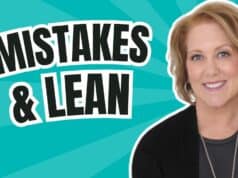I'm excited that Episode #22 of my new podcast “My Favorite Mistake” is now released!
You can listen to it (or watch it or read a podcast) via my MarkGraban.com website:
Episode #22: Karen Martin on Leaving Her Corporate Job to Go Solo
Joining me for Episode #22 is Karen Martin, who readers here most likely know from her Lean work and previous appearances on my Lean podcast.
Karen and I discuss her “favorite mistake” about leaving a corporate job to go solo. We have a very interesting discussion about how to create an organizational culture where it's safe for people to talk about mistakes. She also shares an insightful thought on why it's “arrogant” to think we have certainty in what's going to happen in a workplace (as opposed to viewing things as experiments that will play out).

Partial Transcript:
Here is the partial transcript of that section on certainty:
Mark: Yeah. So there's, you know, expectations, or we could use language like predictions or hypothesis. What was your hypothesis? You know, that sounds a little wonky or, you know, you have a science background, so you're comfortable.
Karen: Yep. And you know what, it's really interesting, you know, once, once we finally figured out problem-solving and started teaching at, we mean the collective improvement leadership mean community, the collective group, once we started talking and framing about it in scientific terms, I was really nervous that people would be kind of a little, ooh, that sounds, you know, scary, but I, over and over, I find people at all levels of organizations into it. They, they liked that idea of a hypothesis because remember that the old way I'm not having a hypothesis is this is going to work. You know, and this way is pretty liberating because it's like, we think that this might work.
Let's try it and see if it works. And then if it doesn't, it's not set in cement, we go back to something else. So it's a great way to get people that would otherwise be resistant to change, to kind of go along on the journey. And it just makes so much sense in a scientific yeah. Even though science is much more aligned right now by some it's it's, you know, I don't know how you do that. Science is, is pretty darn good.
Mark: Yeah. And this idea of testing and seeing what happens that, you know, in, in some corporate settings, there's this, this craving for certainty and, you know, you know, people get tasked with go prove that this is working. I'm like, well, that doesn't sound like good science.
Karen: Right. You know, I make a comment in the, in Clarity First that it's really important to make sure that you don't, co-mingle certainty with clarity because they're not the same. And it's, it's very unusual to have certainty. I mean, there's really not a whole lot in life that you can say, I am certain because it doesn't work that way. And so if you can heighten, people's sensitivity to the fact that they're even operating from that mindset, then you know, that can free them up to be more hypothesis thinkers and, and experimenters. And, and that's good for everybody. Yes.
Mark: Okay. Can you elaborate a little bit on the different definitions, the way you see it certainty versus clarity? It seems like certainty is I know what's going to happen in the future. How would you explain that?
Karen: Good question. So I think of certainty as being a form of arrogance because we can't actually ever be certain. I mean, we can be certain once facts present and you've got a pattern you can ensure way towards certainty, but you're never really certain. And I think that's a fallacy that even in problem solving, I think it's a fallacy that you want it. You have to get yourself all the way to a point of certainty before you do anything. And it, there you're right. There's such a corporate mindset on, it must be. It has to work, you know, and th this pressure for perfection and things like that, that just aren't realistic.
And so when leaders embrace that certainty doesn't exist, but thoughtful experimentation, we're not suggesting you just, you know, throw spaghetti on the wall and see if it, if it sticks, it's I guess, thoughtful, experimentation based on data, then, then certainty people can kind of relax and not be so hung up on certainty to make clarity is, you know, the opposite of clarity is ambiguity. And so clarity, I define as this it's information, any kind of information, it could be visual. It could be verbal, whatever that coherent, you know, it kind of hangs together. There's not people going, you know, that that's a sign that there's not coherence, it's precise.
So there's not a lot of guessing that you have to do. It's not a lot of hard work figuring things out and it's elegant. So it's easy. Those are the three definitions I came up with when I was writing the book on what clarity is. So, or the con the elements of clarity are the conditions, the clarity.
Mark: Yeah. So it seems like maybe just repeat back, tell me if I've, if I've got this. So if we're thinking about launching some sort of initiative in an organization, somebody might have unfounded certainty that it's going to be a success. And then if you ask, well, how do we know, how is that initiative working? And if someone says, well, I feel like it's going well, that's more ambiguity where we're clarity would come from data or facts, or…
Karen: Yes, sir, certainly subjective that I feel. And you know, the other thing that we see a lot in you, and you've seen this too, when you're doing any kind of analysis, very often people believe that there's a far more frequent situation than it actually bears out in the data because bad things feel more frequent there. They occupy our attention. They command our attention differently than easy does and, and things going well. And so painful things do feel a lot more frequent. So you can be going down a root cause analysis path and people think they know, and, and because it feels that way and you look at data, it's like, oh, that's so wasn't the root cause.
And, and it's, it's just, I love that stuff. I know it's just so fun to, to get people's light bulbs going on. And when they go, wow, you know, I was operating with a bias or an assumption or from a place of kind of arrogant, you know, thinking I know when I don't and, and things like that. It's it's, I love that part of the work.
Also, check out here relatively new TKMG Academy with her online training offerings.
I'll post a link to each episode here on my blog on Mondays and Thursdays. I hope you find it to be interesting and thought provoking!
Here are two previous Lean podcasts with Karen, also:
Thanks for listening and/or watching!
What do you think? Please scroll down (or click) to post a comment. Or please share the post with your thoughts on LinkedIn – and follow me or connect with me there.
Did you like this post? Make sure you don't miss a post or podcast — Subscribe to get notified about posts via email daily or weekly.
Check out my latest book, The Mistakes That Make Us: Cultivating a Culture of Learning and Innovation:








